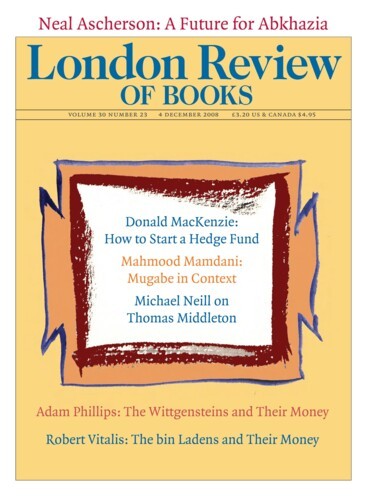‘Annie listless.’ They take her to Ramsgate
to try what seawater can do. On the beach
he picks up shells. He is still a collector. Emma
watches a bathing-woman in baggy blue
coax Annie to the caravan-machine
drawn by two horses out to sea; and thinks through
in her head a Beethoven sonata and cadenza. | In autumn 1850 Darwin’s ten-year-old daughter Annie was ill. Charles and Emma took her to Ramsgate. |
Every day behind a stripy awning,
Blue Woman lowers Annie into sea.
But Annie catches cold. Then influenza.
He takes her, with sister Etty for company,
to Malvern. Emma, seven months pregnant, stays behind.
‘If the girls take letters to Malvern post office
by six, I’ll receive them at our garden gate at noon.’ * She stands in the flower garden. A wind like chain mail
sweeps the grass. * | In March 1851 Charles took Annie, with her seven-year-old sister Etty, to Malvern. He settled them with a nurse in a water-cure establishment and arranged for the children’s governess Catherine to join them. |
‘Mamma, I have six ladybirds in a box.
I feed them milk and sugar.’ * | Letter from Etty, 1851. |
‘Let Mr Darwin come back at once to Malvern.
Annie very ill, with a smart, bilious, gastric fever.’ * | The governess, Catherine Thorley |
‘Annie in a fearful mess. Vomit, diarrhoea.
We keep her sweet with chloride of lime.
We sponged her today with vinegar and water
to excellent effect. I will write to you every hour.
It is a relief to me. Whilst writing I can cry
very tranquilly.’ * | Charles |
Good Friday. Three retching fits. Emerald fluid.
‘It seems an exaggerated form of my own illness.
She inherits, I fear, my own wretched digestion.’ | Charles |
Saturday. ‘Your cousin has come. Dr Gully still has hope …
Oh my dear be thankful. Annie has rallied. Passed a good
night. Danger much less imminent.’ * | Emma, heavily pregnant, asked her sister-in-law Fanny Wedgwood to go to Malvern to be with Charles. Fanny’s maid brought Etty back home. |
‘I received your cable by electric
telegraph. I was in the garden, alone,
looking at my poor darling’s little patch
of flowers. I hardly dare think of such happiness.
I hope you will sleep tonight, my own.’ * | Emma |
‘I feel most anxious about Charles, dear cousin,
but your being with him is such a comfort. By oneself, one’s thoughts lose all control.
The worst, for me, is waiting for the post.’ * Easter Sunday. Downe Church altar gay
with apple blossom. A day of loose
flowers and hope. There is One who holds the petals’ falling in His hands. She stays home –
final stage of pregnancy – to pray
while the six other children are at church. * | Emma to Fanny |
He cannot sit quiet. He has to pace the room
and write to her. ‘The doctor says
there still is hope. But you would not recognise
her poor sharp hard pinched face.’ * | Charles |
Monday. Red, brightly mottled things
swarm over and through his eyelids.
‘The alternatives, hope and no hope,
sicken the soul. A mustard poultice
on her stomach smarted her a good deal
but when we sponged her down
delicious to see how it soothed! I never saw anything so pathetic as her patience.
She has just said “Papa” quite distinctly.
She does not suffer, thank God.
The note from you
made me cry much, but I must not give way.
It is, from hour to hour, a struggle between life
and death. God only knows the issue.’ * | Charles |
Tuesday. ‘I grieve to tell you, dearest Emma –
Charles cannot write – a worse report this evening. The end seems near. We are thankful
for the mercy given us of there being, in your sweet patient darling, not the least appearance
of suffering. Twice in her delirium I heard her trying to sing – so I think the wandering
could not have been distressing.’ * | Fanny Wedgwood |
Wednesday morning. The sky a livid iron-grey
and overcast. ‘At 12 o’clock came a peal
of thunder and we heard her breathe her last.’ * | Fanny Wedgwood |
Thursday. ‘Till four o’clock, not having heard,
I sometimes had a hope. But when I went to bed
I felt as if it all had happened long ago. Among the prayers and tears, my only thought
of consolation is to have you safe at home
and weep together. I am so full of fears about you, dear Charles. They are not reasonable
fears, but my powers of hoping seem all gone.
I can’t bear to think of you alone.’ * | Emma |
Friday. ‘Our dear had a very short life
but I trust happy. She expired without a sigh
and God only knows what more miseries might,
with her constitution, have lain in store. Do what you can to bear up.’ An ocean. An abyss.
He hears a bell begin to toll. Myth
lets you say something and not say it, too.
He can’t stay for the funeral, can’t pray for Annie’s future bliss. ‘Remember how kind you always were to her.’
Their next is due in three weeks. ‘I long to be with you
and under your protection; for then I feel safe.
I am in bed, not very well – my own poor, dear, dear wife.’ |

